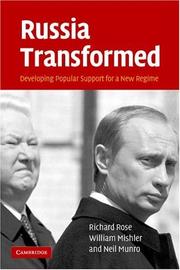| Listing 1 - 2 of 2 |
Sort by
|
Book
ISBN: 9780521224185 9781107009523 9780511809200 9781139079006 113907900X 0511809204 9781139081276 1139081276 9781283111201 1283111209 1107009529 0521224187 1139064207 1107222133 1139076728 9786613111203 1139083546 1139071009 9781139064200 9781107222137 9781139076722 6613111201 9781139083546 9781139071000 Year: 2011 Publisher: Cambridge : Cambridge University Press,
Abstract | Keywords | Export | Availability | Bookmark
 Loading...
Loading...Choose an application
- Reference Manager
- EndNote
- RefWorks (Direct export to RefWorks)
To survive, all forms of government require popular support, whether voluntary or involuntary. Following the collapse of the Soviet system, Russia's rulers took steps toward democracy, yet under Vladimir Putin Russia has become increasingly undemocratic. This book uses a unique source of evidence, eighteen surveys of Russian public opinion from the first month of the new regime in 1992 up to 2009, to track the changing views of Russians. Clearly presented and sophisticated figures and tables show how political support has increased because of a sense of resignation that is even stronger than the unstable benefits of exporting oil and gas. Whilst comparative analyses of surveys on other continents show that Russia's elite is not alone in being able to mobilize popular support for an undemocratic regime, Russia provides an outstanding caution that popular support can grow when governors reject democracy and create an undemocratic regime.
Democracy --- Political participation --- Post-communism --- Russia (Federation) --- Democratization --- Politics and government --- Economic conditions --- Social conditions --- #SBIB:328H262 --- Self-government --- Political science --- Equality --- Representative government and representation --- Republics --- Instellingen en beleid: Rusland en het GOS --- Social Sciences --- Political Science

ISBN: 0521692415 0521871751 9780521692410 9780521871754 9780511492150 9780511257643 0511257643 9780511254994 0511254997 0511257163 9780511257162 0511492154 0511256094 9780511256097 0511256663 9780511256660 1107171962 9781107171961 1280709898 9781280709890 9786610709892 6610709890 0511319878 9780511319877 Year: 2006 Publisher: Cambridge ; New York : Cambridge University Press,
Abstract | Keywords | Export | Availability | Bookmark
 Loading...
Loading...Choose an application
- Reference Manager
- EndNote
- RefWorks (Direct export to RefWorks)
Since the fall of communism Russia has undergone a treble transformation of its political, social and economic system. The government is an autocracy in which the Kremlin manages elections and administers the law to suit its own ends. It does not provide the democracy that most citizens desire. Given a contradiction between what Russians want and what they get, do they support their government and, if so, why? Using the New Russia Barometer - a unique set of public opinion surveys from 1992 to 2005 - this book shows that it is the passage of time that has been most important in developing support for the new regime. Although there remains great dissatisfaction with the regime's corruption, it has become accepted as a lesser evil to alternatives. The government appears stable today, but will be challenged by constitutional term limits forcing President Putin to leave office in 2008.
Public opinion --- Russia (Federation) --- Economic conditions --- Politics and government --- Social conditions --- Russian Federation --- Rossiyskaya Federatsiya --- Rossiya (Federation) --- Rossii︠a︡ (Federation) --- Российская Федерация --- Rossiĭskai︠a︡ Federat︠s︡ii︠a︡ --- Російська Федерація --- Rosiĭsʹka Federat︠s︡ii︠a︡ --- Federazione della Russia --- Russische Föderation --- RF --- Federation of Russia --- Urysye Federat︠s︡ie --- Правительство России --- Pravitelʹstvo Rossii --- Правительство Российской Федерации --- Pravitelʹstvo Rossiĭskoĭ Federat︠s︡ii --- Правительство РФ --- Pravitelʹstvo RF --- Rosja (Federation) --- O-lo-ssu (Federation) --- Roshia Renpō --- Federazione russa --- OKhU --- Orosyn Kholboony Uls --- Russian S.F.S.R. --- Public opinion. --- Eluosi (Federation) --- 俄罗斯 (Federation) --- Social Sciences --- Political Science --- RF (Russian Federation) --- Россия (Federation)
| Listing 1 - 2 of 2 |
Sort by
|

 Search
Search Feedback
Feedback About UniCat
About UniCat  Help
Help News
News